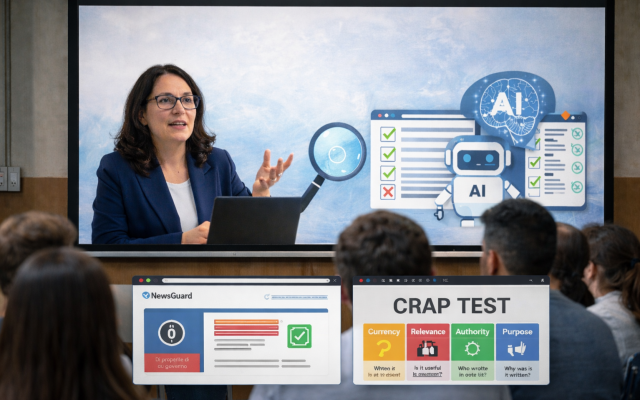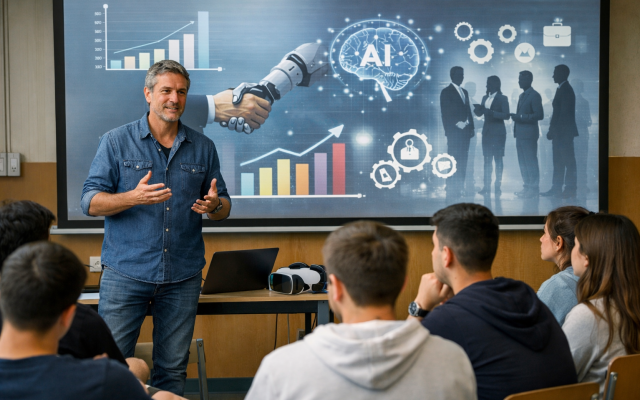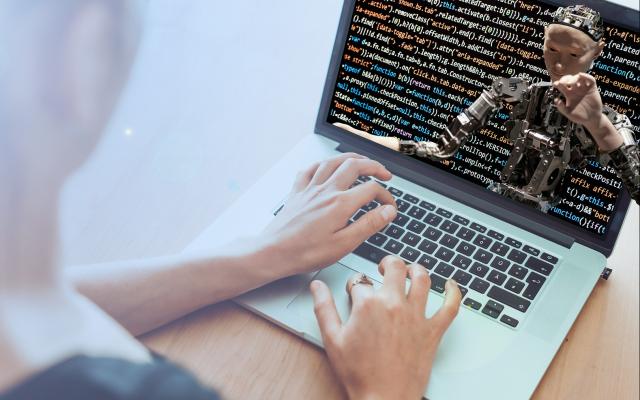Activities at IIS Marconi Mangano in Catania, an Ital.IA Lab hub
The introduction of artificial intelligence (IA) in education has raised a lively debate at the Istituto superiore Marconi Mangano in Catania. Professors and students have attended a course with Project Ital.IA Lab, promoted with Microsoft Italia.
Here are their stories.
Between Ethics and Creativity with AI
“We formed 16 classes. It was hard, but we made it!” exclaims Maria Teresa Sorrenti, Ital.IA Lab Coach and former school student. "The feedback of the students was immediate, especially in relations to ethics and a conscientious use of AI tools. They also greatly appreciated the use of the Personal Ecosystem Canvas (PEC),” adds Sorrenti. In fact, the course also introduced the students to the use of an innovative tools for personal and collective development conceived by Alfonso Molina, Scientific Director of the Fondazione Mondo Digitale and Personal Chair in Technology Strategy at the University of Edinburgh. The PEC allow students to self-evaluate themselves, identifying strengths and weaknesses, and to define personal and professional growth objectives. Sorrenti also explains that, thanks to the project, the students learned not only about ChatGPT, but also Copilot, appreciating its reliability and connection to sources. During the course, students had the opportunity to directly experience generative artificial intelligence, engaging in a particularly stimulating creative writing exercise. The starting point was to create a narrative around a robot that rebels against the first law of robotics, which normally dictates that robots must not harm humans or allow humans to suffer through their inaction. This scenario paved the way for a variety of narrative conclusions, with some students opting for a utopian ending, imagining an ideal and harmonious future, while others explored more dystopian paths, outlining a future where machines could spiral out of human control. “The course helped them understand that AI may be scary, but it can contribute a lot to our lives.”
Overcoming Diffidence through Knowledge
Raffaella Lisi, PCTO Coordinator, underlined the importance of artificial intelligence as an essential tool in modern education. “Our school chose to join the project because it is now impossible to live without AI,” explains Lisi. Distrust towards AI, for Lisi, mainly derives from a lack of knowledge and the difficulty in fully exploiting its potential. “Even students, who perhaps think they already know everything, actually need to be guided,” explains Lisi, highlighting the need to teach students how to formulate prompts correctly and how to guide AI towards desired objectives, rather than letting oneself be guided.
AI as a Tool, not a Substitute
“The topics addressed during the course were appreciated by both the students and teachers,” says Antonio Giuffrida, PCTO Coordinator and Ital.IA Lab tutor. Although teachers have not yet integrated generative AI into daily teaching, they are aware of the need to approach this technology to keep up with students. Giuffrida also emphasised the importance of a conscious use of AI: “What is important is to make students understand that AI is a tool, but it cannot replace humans. It is not worth using it to 'cheat', but rather it should be used carefully." Giuffrida also proposed reviewing teaching to evaluate students' soft skills, such as problem-solving and source-checking, rather than limiting themselves to the evaluation of traditional tasks.”
AI and Future Aspirations: Academic and Professional
“For us, it has become a commonly used tool, like Google and other search engines,” explains Pietro Caruso, a computer science student. However, he admits that the fact that AI could develop too quickly and escape human control is a concern. “I use it to create some programmes” points out Pietro, highlighting how AI helps him understand and improve his skills. “When I have doubts or encounter a problem, I use AI to get an example or a practical exercise to help me understand how to improve and implement a programme,” he said. “This approach allows me not only to solve problems but also to improve my mastery of programming languages through targeted exercises.”
A key concern for Pietro is the protection of privacy and data protection: “One thing that definitely needs to be improved is the protection of privacy, the protection of user data.” Pietro is also convinced that AI should not invade our private lives but serve exclusively as a tool for work and education.
With an eye to the future, Pietro has already outlined his course: "After school, I would like to go to university to study computer science or computer engineering." AI will certainly be a constant companion in this academic and professional journey.




